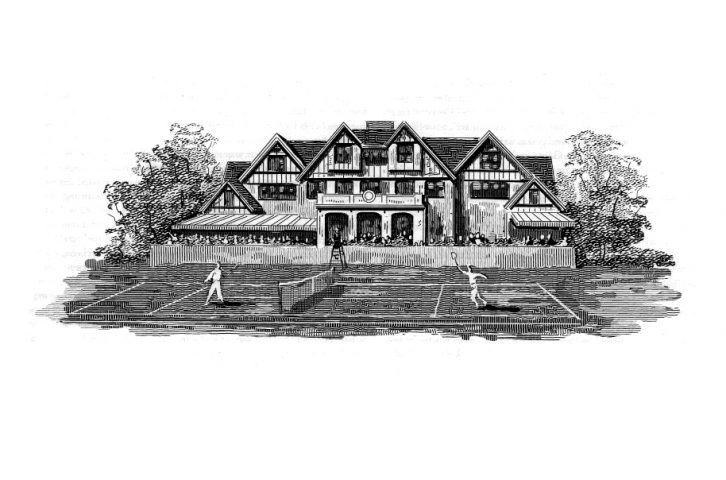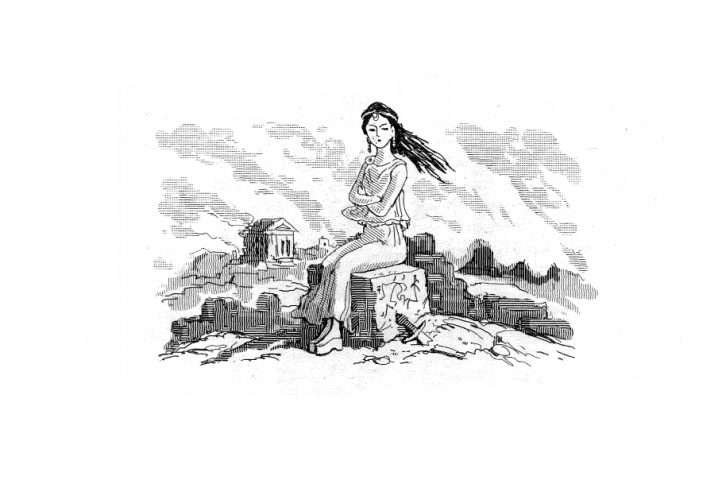Books Reviewed
When E. Brooks Holifield writes that for the first 100 years of the republic, theology “ruled the realm of ideas,” he exaggerates, but not by much. Religion was the center of what would now be called popular culture. The Bible was America’s “great code,” religious doctrine pervaded literature and the arts and dominated the teaching of philosophy, and for great numbers of Americans, theological argument—the “polemic divinity” Franklin disdained—was romance and mystery and their favorite contestation. New England was admittedly an extreme case, but softened only a little, Van Wyck Brooks’s description applies to America in general. New England congregations, Brooks said,
Talked about fate and freedom and how evil came, and what death is, and the life to come, as familiarly as they talked about their crops and the weather. One heard about “potential presence” and “representative presence” and “representative identity,” and Dr. Bancroft’s sermon on the fourth commandment. Blacksmiths and farriers, youths and maidens argued about free will and predestination, about “natural ability” and “moral ability” and “God’s efficiency” and “man’s agency.”
E. Brooks Holifield does a remarkable job of evoking the sounds and substance of those disputes. Holifield is Professor of Church History at the Candler School of Theology at Emory University, and the author, among other works, of The Covenant Sealed, a study of Puritan sacramental theology. His erudition is prodigious, up to the standard of his mentor, Sidney Ahlstrom, and his book attends to every major theological school and a good many minor ones, acquainting his readers not only with the titans, like Jonathan Edwards or William Ellery Channing, but with less visible thinkers like the communitarian John Williamson Nevin or the democratizing theologian, Alexander Campbell, who thought that the election of Thomas Jefferson might signal the end of the reign of the Antichrist. Moreover, Holifield takes ideas seriously; he makes the necessary references to social contexts or political conditions, but he presents American theology as an ongoing conversation, and his “overarching theme” is the theologians’ preoccupation with enlisting reason in the cause of faith.
Inevitably, there is some unevenness in his discussions. His treatment of Emerson, for example, is more or less perfunctory, sliding over the darker relativism of Emerson’s teaching, and his presentation of Orestes Brownson does not mention Brownson’s The American Republic, the great political testament of Brownson’s Catholic years. It doesn’t help that Holifield seems unaware of the work of Leo Strauss and his students: he knows Locke’s Reasonableness of Christianity, but he does not appear to recognize the implications for Locke’s own writing of his praise of Jesus for His wise “concealment of himself” and His reliance on a subtext evident to the well-disposed and reflective. Similarly, Holifield’s references to virtue, ethics, and morals often appear to slight significant differences in the meaning of those terms, as in Franklin’s definition of sincerity (“use no hurtful deceit”). Nevertheless, that Mark Noll calls Holifield’s work “magisterial” is compelling evidence of its excellence.
* * *
Broadly, Holifield is telling a story of decline: the once dominant and relatively coherent Calvinism of the Reformed tradition yielding ground and fragmenting under the impact of individualism and democratization, on the one hand, and the intellectual influence of successive waves of modernity on the other. In this recounting, Holifield’s otherwise admirable focus on theological ideas is something of a problem, for it would be easy to read Theology in America without recognizing the extent to which the pattern he describes—liberating religion’s energies while moderating its authority—is part of the design of the American Founding.
Tocqueville’s teaching gave politics pride of place: the American republic was founded on a balance between the “spirit of liberty,” embodied in the laws, and the “spirit of religion,” entrenched in the “habits of the heart,” with the latter more influential in the short term. Yet over the long term, American laws could be expected to change American habits, especially because, in a country devoted to religious freedom, churches cannot command: they must persuade opinion, or adapt to it. Holifield recognizes this necessity, of course, indicating how much it was strengthened by the fact that from the beginning, American theology united the Protestant principle of the freedom of conscience with an intense concern to be “practical,” not merely speculative; able to speak to life in the saeculum. And Holifield also notes that this emphasis on the conduct of life marked the common ground between religion and those less-than-orthodox members of the founding generation who valued its moral teachings even as they despised its metaphysics and mysteries. But the greatest expression of that commonality, the theology of the Declaration of Independence, is only an incident in Holifield’s history.
That Calvinism sets the stage for Holifield’s America would once have seemed unexceptional. Now Holifield feels obliged to note that “historians of American religion” no longer think that the New England clergy merit “a place of special privilege in the national religious narrative,” going on, gently, to correct that view: Calvinist theologians dominated the early dialogue of theology in America, so much so that even their critics felt compelled to define themselves in relation to Calvinist teachings. His discussion of Calvinism is adroit, especially in his analysis of Covenant theology, including the view that law and community can rule (and in this-worldly terms improve) even an unregenerate will, and in pointing to the rhetorical complexities of a theology that was intended to be for, but decidedly not of, the people.
* * *
Nonetheless, the centerpiece of Holifield’s narrative is his treatment of the religious response to the challenge of new ideas—deism and natural religion; the natural science of Copernicus and Newton, Lyell and Darwin; and historicism, with specific emphasis on the historical criticism of Scripture. Even the most conscious of conservatives, Holifield observes, modified tradition in the act of defending it. The formidable Charles Hodge, who taught at Princeton Seminary until the 1870s, was known to say, with some pride, that no new idea had ever been born there. Yet Hodge, who detested “mysticism” and the historicism of Hegel and Emerson as steps toward pantheism, qualified the Bible’s authority even as he defended its infallibility. Mindful of the discoveries of science, Hodge argued that while the Bible is infallible, its interpreters are not; moreover, the secular and scientific “opinions” of human writers, expressed in biblical texts, must be distinguished from the fundamental doctrines of the faith.
The one theological inevitability, in Holifield’s mild version of historicism, is change. Some theologians, past and present, have been more or less inclined to embrace new teachings, as in the proto-Unitarianism of Benjamin Colman’s “enlarged Catholick spirit,” the natural religion of John Bulkley, or the moderate deism of Thomas Jefferson. By far the greater number of American theologians, however, sought some synthetic defense, seeking to find support in the new doctrines for the old teachings. Even Jonathan Edwards’s remarkable reformulation of Calvinism included a bow to Locke’s sensationalism (“gracious affections”), a limited idea of human agency (“natural ability”), and a tincture of the idea of progress in history (“the moral government of God”). This quest for a newly-reasoned vindication of faith was most evident in “Baconian evidentialism,” the focus of the central section of Holifield’s book. This persuasion turned to “the Scottish philosophy,” the Common Sense doctrine of Thomas Reid, finding support for revealed faith in the “first principles” of the mind; or to natural theologies like William Paley’s, using these “external evidences” to buttress the more traditional “internal evidences” of prophecy and miracle.
Almost from the beginning, there were also theologians—their numbers increased with time—who distrusted the intellective bent of such “Baconian” doctrines and preached a religion that places more reliance on the affections and on inspiration. These teachings were often associated with revivalism and inclined to emphasize the sinner’s ability to repent—the relatively individualistic Baptists, for example, or the more communal Methodists, or the Christian perfectionists of the school of Charles Grandison Finney, with its frequent links to militant reform. Yet there were also intellectually more prestigious appeals to intuition and inner experience that resorted to a language of poetry and metaphor, like Transcendentalism or the less heterodox teachings of Horace Bushnell—both doctrines, as Holifield points out, that rest on fundamentally individualistic and even relativistic foundations. And of course, America never lacked even more “populist” theologies, appealing to the people and to the “right of private judgment” against the “exquisite refinement” and aristocratic pretension of a clergy more learned than inspired. As Alexander Campbell taught, “All are one in rank and privilege in Christ’s kingdom.” As Holifield indicates, however, all such critics of theological rationalism and erudition—including the most radical of the theological populists—were soon forming their own schools and writing their own learned treatises, drawn into the argument by the logic of dispute.
Outside of the Calvinist tradition, as Holifield indicates, matters differed only in degree. Tocqueville celebrated the prospects of Catholicism in America, but he also noted the extent to which the Church had accommodated itself to democracy and even to the separation of church and state. And for all its distinctiveness, Catholicism mirrored the tension between traditionalists and modernizers.
* * *
For theology as for the union, the slavery crisis was a decisive moment, but for theology, Holifield argues, the result was disastrous. Southern apologists pointed to the biblical texts that treated slavery as undesirable but legitimate, at least for those outside the covenant. Literalism became their theological fortress, and when antislavery writers observed that portions of the Scripture also legitimate polygamy, some proslavery theologians, for the sake of consistency, even found kind words for that institution. Slavery’s theological opponents, by contrast, read the Bible as a narrative of liberation, with some, like Francis Wayland, embracing ideas of progressive enlightenment and others, the vast majority, seeing in biblical teaching an implicit endorsement of natural rights. (The two positions, Holifield notes, point toward the opposing camps in today’s “culture wars.”) In the end, Holifield contends, even if reflective observers did not decide that theology was simply the rationalization of economic and sectional interests, it was hard to avoid the conclusion that it had lost any claim to preeminence.
It is true enough that, in post-Civil War America, theology, though still influential, grew increasingly marginal in national life. But secular ideas were also diminished; reason suffered along with faith. It became increasingly common to regard human events as the result of force or forces, great currents of interest, irrationality, or the will to power. And secular philosophy along with theology—losing confidence that moral order can be found in nature—became more and more inclined to retreat to the inner fortress of conscience or spirit, anticipating the belief in a radical separation between fact and value.
Lincoln, however, provided another reading of the Civil War, as the vindication of the Declaration’s theology in its claim to rule over American political opinion, just as African-American theologians saw it as the fulfillment of a Divine promise, the nation led at long last out of Egypt to begin its century-long journey through the wilderness. That understanding, evidently, offers a special calling for our times.
Holifield is right to say the great days of theology are “worth remembering,” if only because the “ancient yearnings to know the truth” that inspired them are still very much with us. Confiding that religion would endure because it speaks to permanent needs of the human spirit, Tocqueville was concerned that too-secular Americans would be left with uneducated souls, so that when religious needs did assert themselves, American spirits would lack common sense. Spiritually hungry but frequently unschooled, contemporary Americans have everything to gain from the great texts of their tradition, and we have reason to thank Holifield for marking the trail of remembrance.





